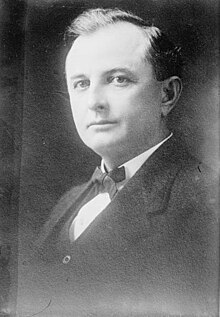James Edward Ferguson
| James Edward Ferguson Jr. | |
|---|---|
 |
|
| 26th Governor of Texas | |
|
In office January 19, 1915 – August 25, 1917 |
|
| Lieutenant | William P. Hobby |
| Preceded by | Oscar Branch Colquitt |
| Succeeded by | William P. Hobby |
| First Gentleman of Texas | |
|
In role January 17, 1933 – January 15, 1935 |
|
| Preceded by | Maud Abbie Sterling |
| Succeeded by | Joe Betsy Allred |
|
In role January 20, 1925 – January 17, 1927 |
|
| Preceded by | Myrtle Neff |
| Succeeded by | Mildred Moody |
| Personal details | |
| Born |
August 31, 1871 Salado, Bell County Texas, USA |
| Died | September 21, 1944 (aged 73) |
| Resting place | Texas State Cemetery in Austin |
| Political party | Democratic |
| Spouse(s) | Miriam A. Ferguson |
James Edward Ferguson Jr. (August 31, 1871 – September 21, 1944), known as Pa Ferguson, was an American Democratic politician and the 26th Governor of Texas, in office from 1915 to 1917. Later, he was the first gentleman of Texas for two nonconsecutive terms.
Ferguson was born to the Reverend James Ferguson, Sr., and Fannie Ferguson near Salado in south Bell County, Texas. He entered Salado College at 12 but was eventually expelled for disobedience. At 16, he left home and drifted through the states of the American West, having been employed in a vineyard, a mine, a barbed wire factory, and a grain ranch. After he returned to Texas, he studied law in Bell County and was admitted to the bar.
On December 31, 1899, he married Miriam A. Ferguson at the Wallace family home. In 1903, he became the city attorney in Belton and established Farmers State Bank. In 1906, he sold Farmers bank and established Temple State Bank. He also managed several local political campaigns.
In 1914, Ferguson was elected governor of Texas by running as an anti-prohibitionist Democrat. He served from January 19, 1915 to August 25, 1917.
On March 24, 1915, Ferguson finally signed the textbook law in Texas simplifying the laws to accommodate the common man.
After being re-elected in 1916, Ferguson vetoed the appropriations for the University of Texas. The veto was retaliation against the university because of its refusal to dismiss certain faculty members whom Ferguson found objectionable, including former Texas Lieutenant Governor and founder and dean of the University of Texas School of Journalism, William Harding Mayes, who had been an opponent of Ferguson for the Democratic party's nomination for governor in 1914.
...
Wikipedia
